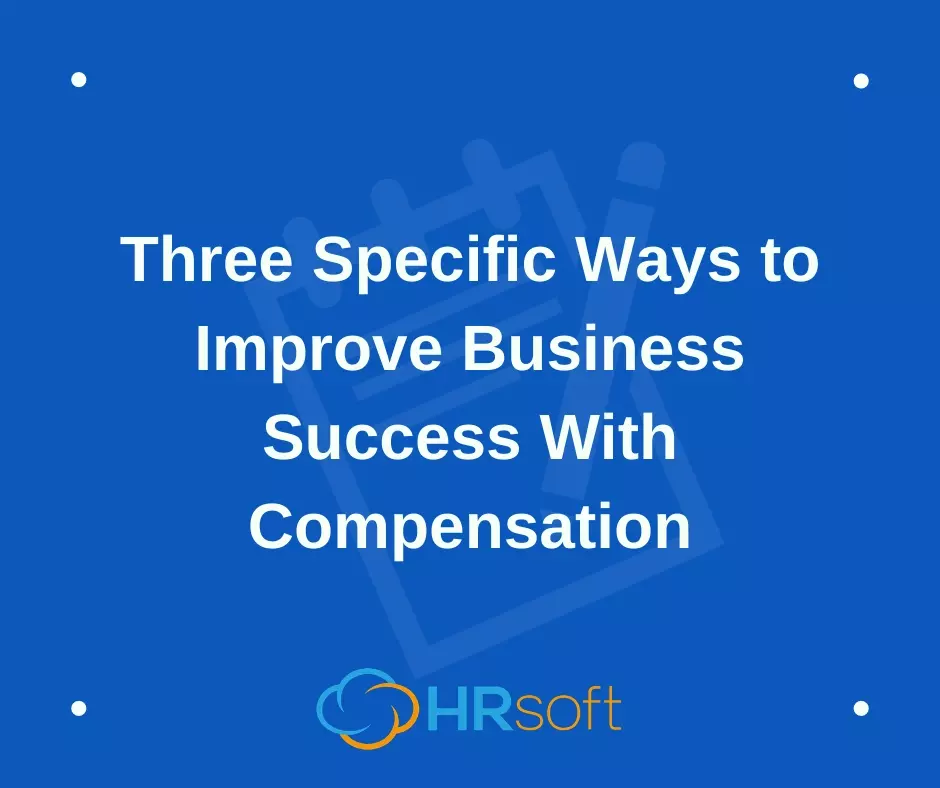Compensation: Impact on Your Organization
Three specific ways to improve business success through compensation. Doing these items can benefit your company in the near term.
When you pay employees right, your company wins - and employees win. But there is more to compensation than filling in the cells on a spreadsheet for each associate’s salary and bonus.
If employees are not paid right, they will leave your company. They go somewhere else to receive the proper compensation. Or, they will stay and be dissatisfied. This dissatisfaction will show up in their work: how they treat customers, how they approach projects. They will check-out. Checked-out employees will drag down business results. Goals will not be achieved; innovation will not thrive.
Your employees expect clarity and candor about their compensation. They want routine, direct discussions about their personal compensation and rewards. During the coronavirus pandemic, employees understand that there may be more flexibility in their compensation as business conditions change. Driven by advanced technology, AI, outsourcing, contingent labor - and now Covid - it is a new world of work and a new world of compensation.
Let’s consider three practical ways employers can get a positive impact through compensation.
- Share Your Clear Compensation Strategy with All Employees
- Have Frequent Compensation Conversations (Every Six Months)
- Technology for Managers to Consistently Use
1. Share Your Clear Compensation Strategy with All Employees
Paying employees right starts with having a clear compensation strategy that is fully understood by all associates. This will remove doubt regarding how you think about compensation and what employees should expect. This strategy supports the company’s culture. It should be short and simple. Post it on your web site, share it with candidates, make a short video describing the strategy, frequently remind managers about what it contains. Share it all around.
In stating the compensation strategy, focus on how compensation aligns with your business priorities. Maybe you want to emphasize rewarding employees for achieving results. Or maybe you want to stress rewarding teams for their accomplishments. Or you might emphasize how you adjust salaries to be competitive with the rest of the market.
For example, Starbucks says on their web site: As a partner (employee) who is curious, collaborative and a continuous learner, you’ll have limitless opportunities to make an impact and thrive, all while becoming your personal best and being recognized for it. We reward partners who achieve results, live our mission and values and help others succeed.
2. Frequent Compensation Conversations
Managers or Team Leaders should have compensation conversations with their team members on a regular schedule. For example, every six months. (Once a year is not enough.) This direct communication is to review how much an associate is being paid, eligibility and tracking of variable pay, bonus or incentive plans and to discuss any questions or concerns.
Having the conversation builds trust. Such discussions send a clear message that the employer is tuned into compensation issues and encourages a full understanding of pay and rewards by associates. For the employee, this opens the door to having a dialogue, clarifying uncertainty and expressing thoughts.
Many companies do not have these frequent compensation conversations between manager and team member. This creates a feeling on the part of associates that their employer does not care and is not in touch with what matters to employees.
3. Technology for Managers to Consistently Use
Centralized software to manage compensation can add strong value and make a positive difference. For HR and compensation professionals, the software allows for execution of the compensation plans that have been designed to support priorities.
The software is also used by team leaders – front line managers – to make smart decisions and recommendations about salary changes and rewards. Within the software are support tools that explain the design of plans along with guidelines that should be adhered to.
With the software, employers gain consistency and visibility. Importantly, specialized software replaces the e-mailing of multiple spreadsheets around the company. As a result, data security and financial controls are enhanced.
Compensation is meaningful to every employee. Being secretive about compensation is a thing of the past. Today, leading employers are changing direction. They approach compensation openly and promote routine conversations. These companies see compensation as an opportunity to improve business success. Employees are in favor of this approach.
HRsoft is a partner of UKG and has an automated data transfer in place. Discover more about HRsoft's COMPview software for advanced compensation management.
The content from this blog is courtesy of Ezra Schneier, Corporate Development Officer, HR Soft- The Leader in Compensation Management Software. To learn more about HR Soft and UKG partnership, visit their marketplace page.



